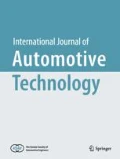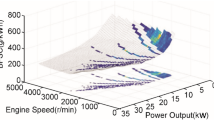Abstract
In this study, the influence on fuel economy testing of gasoline-powered vehicles is evaluated for various test conditions (e.g., laboratory temperature, soaking time, cooling fan, battery charge state, and driving mode tracking). It showed a difference in fuel economy results of approximately 3 % between low (88 %) and high (99 %) battery state of charge conditions because the alternator saving function has a positive effect on fuel economy. Fuel economy testing with laboratory temperature changes gave a slight reduction at 21 °C and slight increase at 29 °C. The cooling fan changes had an almost negligible effect on fuel consumption. The largest fuel economy result varied by 5.2 % in the soft, standard, and rough driving conditions.
Similar content being viewed by others
Abbreviations
- ASCR:
-
absolute speed change rating, %
- DR:
-
distance rating, %
- EER:
-
energy economy rating, %
- EPA:
-
environmental protection agency in US
- ER:
-
energy rating, %
- FTP:
-
EPA federal test procedure
- HWFET:
-
EPA highway fuel economy test cycle
- OBD II:
-
on-board diagnostic system
- SAE:
-
society of automotive engineers
- SOC:
-
state of charge, %
- UDDS:
-
urban dynamometer driving schedule
References
Blanks, M. and Forster, N. (2016). Technical approach to increasing fuel economy test precision with light duty vehicles on a chassis dynamometer. SAE Paper No. 2016-01-0907.
Jehlik, F., Wood, E., Gonder, J. and Lopp, S. (2015). Simulated real-world energy impacts of a thermally sensitive powertrain considering viscous losses and enrichment. SAE Paper No. 2015-01-0342.
Kessels, J., Koot, M., Jager, B., Bosch, P., Aneke, N. and Kok, D. (2007). Energy management for the electric powernet in vehicles with a conventional drivetrain. IEEE Trans. Control Systems Technology 15, 3, 494–505.
Kim, S., Kim, K., Ha, J., Kwon, S. and Seo, Y. (2016). A study about impact of battery SOC on fuel economy of conventional diesel vehicle. Trans. Korean Society of Automotive Engineers 24, 4, 480–486.
Kwon, S., Um, J., Kang, E. and Seo, Y. (2015). Analysis the effects of fuel economy due to the test condition changes in gasoline vehicles. KSAE Annual Conf. Proc., Korean Society of Automotive Engineers, 203–206.
Ministry of Trade, Industry and Energy (2016). Notification according to test methods of energy consumption efficiency, greenhouse gas emission and fuel consumption rate of vehicle. No. 2016-209.
SAE International Standards (2011) Drive Quality Evaluation for Chassis Dynamometer Testing. SAE J 2951, J2951_201111.
Wood, E., Gonder, J. and Jehlif, F. (2017). On-road validation of a simplified model for estimating realworld fuel economy. SAE Paper No. 2017-01-0892.
Author information
Authors and Affiliations
Corresponding author
Rights and permissions
About this article
Cite this article
Kwon, S., Kang, M., Seo, Y. et al. Effects of Test Conditions on Fuel Economy of Gasoline-Powered Vehicle. Int.J Automot. Technol. 19, 253–261 (2018). https://doi.org/10.1007/s12239-018-0024-1
Received:
Revised:
Accepted:
Published:
Issue Date:
DOI: https://doi.org/10.1007/s12239-018-0024-1




